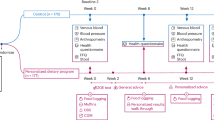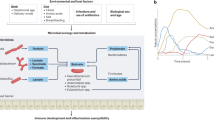Abstract
Objective: To assess the impact of zinc supplementation during acute diarrhoea on subsequent growth and morbidity in malnourished young children.
Design: Double blind randomized controlled clinical trial
Setting: International Centre for Diarrhoeal Disease Research, Bangladesh.
Subjects: Sixty-five children aged 3–24 months with acute diarrhoea for less than 3 d.
Intervention: Either elemental zinc (20 mg/d) in a multivitamin syrup or multivitamin syrup alone divided in three divided daily doses for a period of two weeks. Children were followed up weekly at home to assess subsequent growth and morbidity for a period of eight weeks.
Main outcome measures: Gain in length and body weight and reduction in diarrhoea and respiratory tract infection.
Results: During the follow-up, zinc supplemented children showed significantly greater cumulative length gain (18.9 mm vs 14.5 mm, P<0.03) and comparable body weight gain than the children of the control group. Subsequent length gain was not correlated with initial height in the zinc-supplemented group (r=−0.13), P=0.5), but was significantly correlated in the control group (r=-0.6, P<0.0007). Zinc-supplemented and stunted children ( ≤ 90% length for age n=18) experienced significantly fewer episodes of diarrhoea (0.07 vs 0.6, P 0.05) and respiratory illness (1.0 vs 2.4, P<0.01) compared to the control group. The underweight children (≤ 71% weight/age n=38) receiving zinc-supplementation also had fewer episodes of diarrhoea (0.4 vs 1.0, P<0.04) and shorter duration of diarrhoeal episodes (1.0 vs 3.0 d, P<0.04) compared to their counterparts in the control group.
Conclusion: These results suggest that a short course of zinc supplementation to malnourished children during acute diarrhoea reduces growth-faltering and diarrhoeal and respiratory morbidity during subsequent two months.
Sponsorship: Wellcome Trust.
This is a preview of subscription content, access via your institution
Access options
Subscribe to this journal
Receive 12 print issues and online access
$259.00 per year
only $21.58 per issue
Buy this article
- Purchase on Springer Link
- Instant access to full article PDF
Prices may be subject to local taxes which are calculated during checkout
Similar content being viewed by others
Author information
Authors and Affiliations
Rights and permissions
About this article
Cite this article
Roy, S., Tomkins, A., Haider, R. et al. Impact of zinc supplementation on subsequent growth and morbidity in Bangladeshi children with acute diarrhoea. Eur J Clin Nutr 53, 529–534 (1999). https://doi.org/10.1038/sj.ejcn.1600734
Received:
Revised:
Accepted:
Published:
Issue Date:
DOI: https://doi.org/10.1038/sj.ejcn.1600734
Keywords
This article is cited by
-
Interventions to reduce post-acute consequences of diarrheal disease in children: a systematic review
BMC Public Health (2018)
-
Serum and hair zinc in severely malnourished Bangladeshi children associated with or without acute lower respiratory infection
The Indian Journal of Pediatrics (2009)
-
Effects of Zinc Supplementation on Physical Growth in 2–5-Year-Old Children
Biological Trace Element Research (2009)
-
Zinc supplementation in the management of shigellosis in malnourished children in Bangladesh
European Journal of Clinical Nutrition (2008)
-
Modulatory effects of selenium and zinc on the immune system
Folia Microbiologica (2003)



